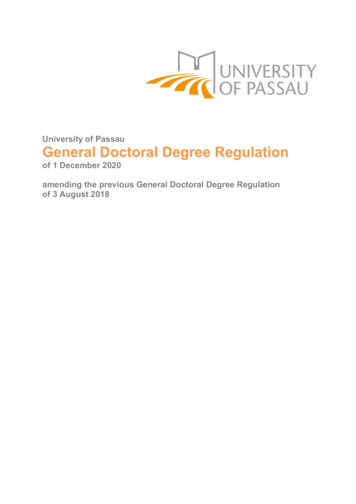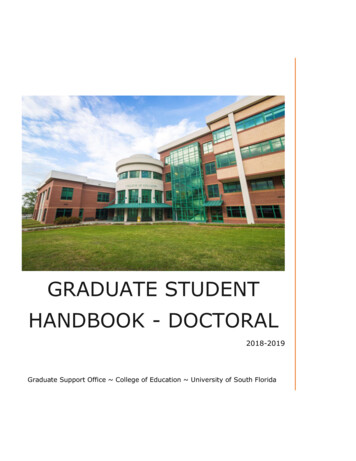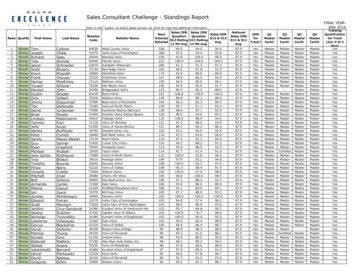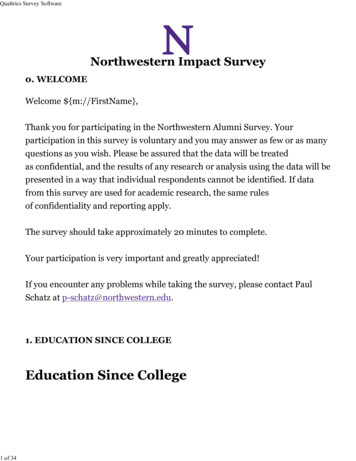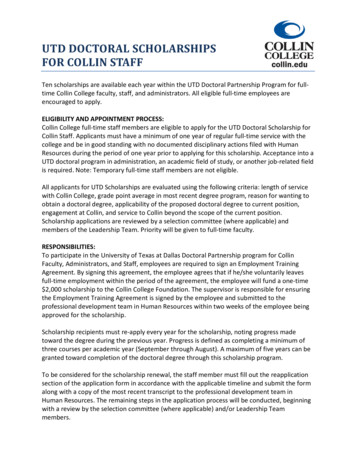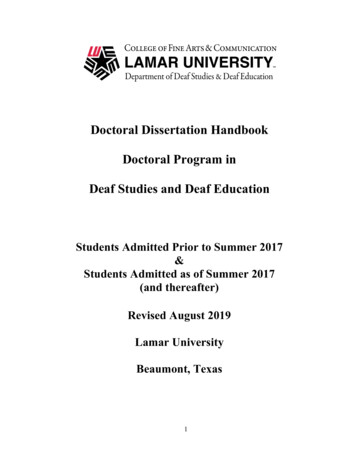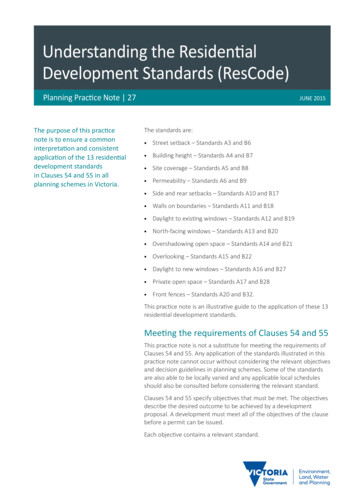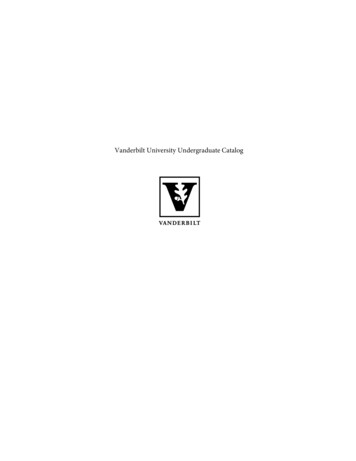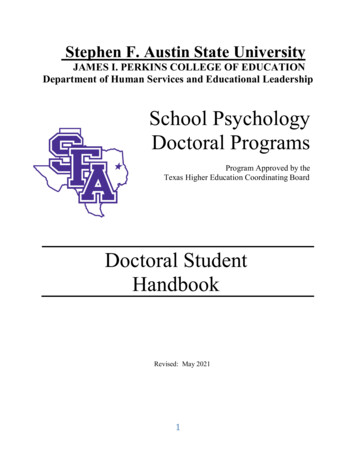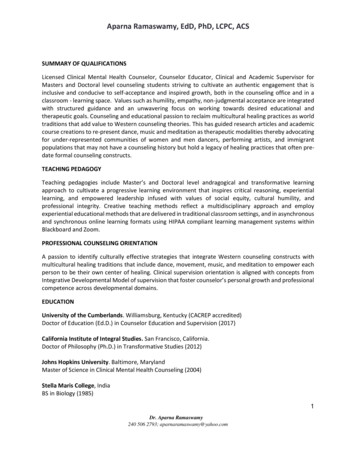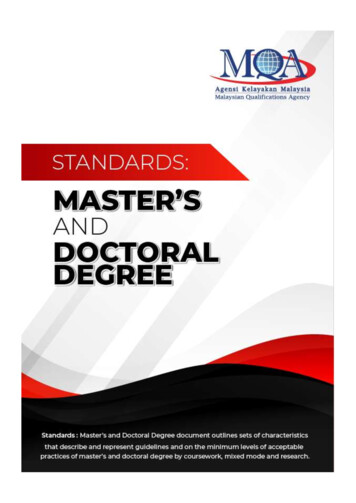
Transcription
1
STANDARDS: MASTER’S AND DOCTORAL DEGREE V2 - APRIL 2021Standards: Master’s and Doctoral DegreeFirst Edition: 2013Second Edition: 2021Malaysian Qualifications AgencyMercu MQA, No. 3539Jalan Teknokrat 7, Cyber 563000 CyberjayaSelangorTelFaxWebsite 603-8688 1900 603-8688 1911https://www.mqa.gov.my Malaysian Qualifications Agency 2021All the Agency’s publications are available on our website: https://www.mqa.gov.my
STANDARDS: MASTER’S AND DOCTORAL DEGREE V2 - APRIL 2021CONTENTFOREWORDBYBYCOURSEWORKRESEARCHAND MIXEDMODEiABBREVIATIONSiiTHE APPLICATION OF THE STANDARDiii1.02.03.04.05.0AREA 1: PROGRAMME DEVELOPMENTAND DELIVERYAREA 2: ASSESSMENT OF STUDENTLEARNINGAREA 3: CANDIDATE SELECTION ANDSUPPORT SERVICESAREA 4: ACADEMIC STAFF127103313371740AREA 5. RESEARCH RESOURCESAREA 5. EDUCATIONAL RESOURCES216.0AREA 6: PROGRAMME MANAGEMENT24497.0AREA 7: PROGRAMME MONITORING,REVIEW AND CONTINUAL QUALITYIMPROVEMENT265146APPENDIX 152APPENDIX 253APPENDIX 354GLOSSARY57TABLETable 1: Master’s Degree by Research –supervision and Co-supervisionTable 2: Doctoral Degree by Research –supervision and Co-supervisionTable 3: Master’s Degree by Mixed Mode andCoursework – Supervision, Co-supervisionand Teaching Staff181840
STANDARDS: MASTER’S AND DOCTORAL DEGREE V2 - APRIL 2021Table 4: Doctoral Degree by Mixed Mode andCoursework – Supervision, Co-supervisionand Teaching Staff41
STANDARDS: MASTER’S AND DOCTORAL DEGREE V2 - APRIL 2021FOREWORDThe Malaysian Qualifications Agency’s (MQA) mission is to ensure the quality ofhigher education qualifications awarded by higher education providers (HEP) inMalaysia. To fulfil this mission, MQA has published various quality documents suchas the Malaysian Qualifications Framework (MQF), Code of Practice for ProgrammeAccreditation (COPPA), Code of Practice for Institutional Audit (COPIA), Code ofPractice for TVET Programme Accreditation (COPTPA), Code of Practice forProgramme Accreditation: Open and Distance Learning (COPPA:ODL), Standards,Programme Standards (PS) and Guidelines to Good Practices (GGP) to ensure thequality of design and delivery of higher education programmes.These quality assurance documents are reviewed periodically to ensure theircontinued relevance to higher education and higher education provision. TheStandards: Master’s and Doctoral Degree (hereinafter called Standard) was issued in2013. This Standards document was revised by an expert panel in consultation withvarious public and private HEPs, relevant government and statutory agencies,professional bodies, related industries and students.The revised Standard outlines sets of characteristics that describe the minimum levelsof acceptable practices in the seven quality assurance areas namely programmedevelopment and delivery, assessment of student learning, student selection andsupport services, academic staff, educational resources, programme management,programme monitoring, review and continual quality improvement based on thestakeholders’ feedback and good practices in postgraduate education.This Standard describes the minimum requirements and practices in master’s anddoctoral degree provision giving the HEPs the autonomy to design and deliverinnovative and market-oriented programmes which reflects institutional goals and theneeds of the nation.Last but not least, I would like to express my appreciation and gratitude to all the panelmembers for their contributions and co-operative spirit, the various stakeholders whohave given their inputs and all the officers from MQA who have contributed to thereview of the Standards: Master’s and Doctoral Degree.Thank you.Prof. Dato' Dr. Mohammad Shatar Bin SabranChief Executive OfficerMalaysian Qualifications Agency (MQA)March 2021i
STANDARDS: MASTER’S AND DOCTORAL DEGREE V2 - APRIL 2021ABBREVIATIONSCOPIACode of Practice for Institutional AuditCOPPACode of Practice for Programme AccreditationCOPPA: ODLCode of Practice for Programme Accreditation: Open andDistance LearningCOPTPACode of Practice for TVET Programme AccreditationGGPGuidelines to Good PracticesHEPHigher Education ProviderMQAMalaysian Qualifications AgencyMQFMalaysian Qualifications Frameworkii
STANDARDS: MASTER’S AND DOCTORAL DEGREE V2 - APRIL 2021THE APPLICATION OF THE STANDARDThis Standard describes the generic requirements for master’s and doctoral degreesbased on MQF level descriptors and areas of evaluation in Code of Practice forProgramme Accreditation (COPPA). The programme standards may contextualise theminimum requirements expressed in this Standard to the needs of a discipline andprofession. In doing so, the specific or programme standards shall not lower therequirements stated in this Standard. The programme standards may establish higherand/or additional requirements if the disciplinary and professional practices deem itnecessary. It is expected that programme standards would maintain the minimumrequirements set in this Standard in the interest of consistency.As a general principle, HEPs have the right to establish any other conditions orrequirements as it deems necessary guided by this Standard, programmes standardsand good practices.iii
STANDARDS: MASTER’S AND DOCTORAL DEGREE V2 - APRIL 2021
STANDARDS: MASTER’S AND DOCTORAL DEGREE V2 - APRIL 2021STANDARDS:MASTER’S ANDDOCTORALDEGREEBY RESEARCH
STANDARDS: MASTER’S AND DOCTORAL DEGREE V2 - APRIL 2021AREA 1: PROGRAMME DEVELOPMENT AND DELIVERYThe vision, mission and educational goals of the Higher Education Provider (HEP)guide its research planning and implementation and bring together its members toproduce graduates of excellence. The general goal is to develop postgraduates within-depth knowledge at the frontier of a specialized field through the: development of knowledge through research based on the systematic/enquiryprocess and its outcomes; enhancement of communications and leadership skills, and attitudes, ethics,sense of professionalism for societal advancement within the framework of theinstitutional and national vision; use analytical and creative problem-solving skills to evaluate and make decisionsbased on research evidence and/or experience; the quest for knowledge through lifelong learning in line with the changes in thefield of studies/practice; research outcomes that are relevant to the national and international development;and dissemination of research through publications and/or products.Research programmes are the building blocks that support the vision, mission andgoals of the HEP. Hence, these institutional goals must be considered in the designand implementation of research programmes. For greater socio-economic impact,these programmes should challenge the candidates and graduates to contribute to theachievement of Sustainable Development Goals.The quality of the research programmes is ultimately determined by the capability ofgraduates to carry out their expected roles and responsibilities as described in theMQF.1.1. Statement of Educational Objectives of Academic Programme andLearning OutcomesA programme’s stated objectives and learning outcomes guide what it wants thecandidates to achieve. These objectives and learning outcomes must be explicitlystated and communicated to the candidates as well as to the internal and externalstakeholders.1.1.1. The programme must be consistent with, and supportive of, the vision, missionand goals of the HEP.1.1.2. The department must formulate the programme, objectives and learningoutcomes in consultation with relevant internal and external stakeholders.RESEARCH1
STANDARDS: MASTER’S AND DOCTORAL DEGREE V2 - APRIL 20211.1.3. The HEP must state its programme educational objectives, learning outcomes,learning and teaching strategies, and assessment methods, and ensureconstructive alignment between them.1.1.4. The programme objectives and learning outcomes must encompass provisionfor training or support to enable research candidates to achieve the outcomesas described in the appropriate MQF Level and expanded in the applicableprogramme standard.1.1.5. The programme’s objectives and learning outcomes must be periodicallyreviewed in consultation with internal and external stakeholders.1.2. Learning OutcomesThe quality of the research programme is determined by the ability of the graduates tocarry out the expected roles and responsibilities in society. This requires theprogramme to have clear statements of the learning outcomes to be achieved. Thesestatements should collectively reflect the appropriate MQF Level descriptorencompassing the five (5) clusters of learning outcomes and other needs of the HEP.No123451.2.1.ClustersKnowledge and UnderstandingCognitive Skills3.1 Practical Skills3.2 Interpersonal Skills3.3 Communication SkillsFunctional Work Skills3.4 Digital Skills3.5 Numerical Skills3.6 Leadership, Autonomy & ResponsibilityPersonal and Entrepreneurial SkillsEthics and Professionalism.The scope of learning outcomes must reflect the knowledge, skills, abilitiesand attitudes outlined in the appropriate MQF Level descriptors thatcandidates should achieve upon completion of the programme and otherneeds of the HEP.Master’s Degree by Research (Level 7, MQF)At the end of the programme, graduates must be able to:i. Demonstrate in-depth and frontier knowledge and understanding in therelevant field/s or practice;RESEARCH2
STANDARDS: MASTER’S AND DOCTORAL DEGREE V2 - APRIL 2021ii.iii.iv.v.vi.vii.viii.Critically and creatively apply knowledge in one or more fields to resolvecomplex disciplinary and practical problems;Conduct rigorous and independent research or investigation withminimal supervision;Perform research adhering to legal, ethical, professional andsustainable practices;Demonstrate intellectual leadership qualities and management skills;Communicate effectively in the field/s and interact with specialist andgeneral audience;Select and use suitable digital and analytical tool techniques to researchproblems; andDemonstrate commitment to lifelong learning and personal development.Doctoral Degree by Research (Level 8, MQF)At the end of the programme, graduates should be able to:i.Demonstrate a critical and in-depth understanding of frontierknowledge by generating substantial and original contributions to a fieldand/or practice;ii.Synthesise existing and new knowledge in one or more discipline areasto develop new concepts or interpretations or applications;iii.Conduct rigorous and independent research or investigation withminimal supervisioniv.Demonstrate intellectual leadership qualities and management skills;v.Perform research adhering to legal, ethical, professional andsustainable practices;vi.Communicate cogently in the field/s and interact with specialist andgeneral audience;vii.Select and use suitable digital and analytical techniques to researchproblems; andviii.Demonstrate commitment to lifelong learning and personaldevelopment.1.2.2. The HEP is responsible for the effective delivery and achievement of theprogramme learning outcomes (to be read together with 7.16).1.2.3. The programme must demonstrate how the planned activities contribute to thefulfilment of the programme learning outcomes (the department must describethe activities and evidence against each of the programme learning outcomesfrom admission to graduation (see Appendix 2)).1.2.4. The programme should specify the link between learning outcomes expectedon completion of studies and those required for careers in research relatedfield/s.RESEARCH3
STANDARDS: MASTER’S AND DOCTORAL DEGREE V2 - APRIL 20211.2.5. There must be appropriate learning and supervision relevant to the programmeeducational objectives and learning outcomes.1.3 Programme Design and DeliveryFor the accreditation of programmes offered by HEPs, the term “Programme” refersto research that is structured for a specified duration and volume of learning for theaward of a master or doctoral degree by research.Academic AutonomyAn academic institution is expected to have sufficient autonomy over academicmatters. Such autonomy should be reflected at the departmental level where theprogramme is being offered.1.3.1.The department must have sufficient autonomy to design the programmestructure and to allocate the resources necessary for the attainment of thelearning outcomes. Where applicable, the provision must also coverprogrammes conducted in geographically separated campuses or incollaboration with other HEPs within and outside the country.1.3.2.The academic staff must be given sufficient autonomy to focus on their areasof expertise in the supervision of candidates, research and writing, scholarlyactivities, academic administration duties, and community engagement.Programme Design and Supervision1.3.3.The department must have a defined process by which the programme isestablished, reviewed, and improved with the involvement of the academicstaff and other stakeholders.1.3.4.A needs analysis for the programme must be carried out to obtain informationfrom stakeholders, whose feedback should be considered in the design andimprovement of the programme.1.3.5.The programme must be only considered after the resources to support theprogramme have been identified and allocated.1.3.6.The programme structure and supervision system must support the attainmentof the programme learning outcomes.RESEARCH4
STANDARDS: MASTER’S AND DOCTORAL DEGREE V2 - APRIL 20211.3.7.The programme must include a variety of academic activities to support theattainment of the learning outcomes and personal development of thecandidates (see Appendix 3).Programme StructureTypically, the programme structure for research masters and doctoral programmes ischaracterised by a supervised research project for a specified duration, production ofa thesis or dissertation or a coherent conspectus1 incorporating, articles, portfolios,artefacts or compositions or some combination of the features and an oralexamination.Within this modality, there are several variations due to the disciplinary practices andinclusion of publications (prior and concurrent) in the thesis submissions. To ensurecomparability of the award as MQF Levels 7 and 8 qualifications, it is critical thatdespite the differences and variations, the candidates are assessed to satisfy similarlearning outcomes. Therefore, within HEPs these modes or variations must bearticulated through a unitary master and doctoral framework. Separate masters anddoctoral frameworks will raise concerns about the comparability of outcomesinconsistent with the MQF.1.3.8.The programme must satisfy the following requirements:Master’s Degree by Researchi. The typical duration of study for full-time and part-time candidates is 2and 3 years, respectively. However, the HEP Senate may allowexemptions for outstanding students who completed their studies withina shorter period.1ii.Candidates must have followed a research methodology course (whichmust encompass the broad approaches, methods and analyses in thefield or discipline) or show evidence of attendance of any equivalentcourses which support research in the field and to be undertaken by thecandidates.iii.The following requirements must be addressed by the HEP:a) Relevant prerequisite courses for candidates without relatedqualifications and relevant working experience or require updating ofknowledge in specified areas before enrolling in the programme.b) Maximum period of study considering good practices and validity ofresearch undertaken.A critical review which locates the artefact/s within a coherent theoretical framework and field/s of study.RESEARCH5
STANDARDS: MASTER’S AND DOCTORAL DEGREE V2 - APRIL 2021c) A dissertation or equivalent conspectus guideline or manual must beprovided to describe a common structure and format for dissertationor conspectus.d) The HEP must establish the minimum word limit subject to theguidance in the relevant programme standards or good practices. TheSenate or the equivalent authority in the HEP can use its discretion incases where a dissertation or conspectus does not comply with theword limit but meets all other requirements.Doctoral Degree by Researchi. The typical duration of study for full time and part time candidate is 3 and4 years respectively. However, the HEP Senate may allow exemptionsfor outstanding students who completed their studies within a shorterperiod.ii.Candidates must have followed a research methodology course (whichmust encompass the broad approaches, methods and analyses in thefield or discipline) or show evidence of attendance in any equivalentcourses which support research in the field/s and to be undertaken bythe candidates.iii.The following requirements must be addressed by the HEP:a) Relevant prerequisite courses for candidates without relatedqualifications and relevant working experience or require updating ofknowledge in specified areas before enrolling in the programme.b) Maximum period of study considering good practices and validity ofresearch undertaken.c) A thesis or conspectus guideline or manual must be provided todescribe a common structure and format for thesis or conspectus.d) The HEP must establish the minimum word limit subject to theguidance in the relevant programme standards or good practices. TheSenate or the equivalent authority in the HEP can use its discretion incases where a thesis or conspectus does not comply with the wordlimit but meets all other requirements.Doctoral Degree by Retrospective or Prior PublicationUnder this mode, the candidate’s publications and other equivalent worksprior to registration are included in the submission for the Doctoral award.i.The minimum duration of candidature is 6 months and must not exceed2 years.RESEARCH6
STANDARDS: MASTER’S AND DOCTORAL DEGREE V2 - APRIL 2021ii.A supervisor must be appointed to:a) Guide the candidate in choosing or organising the published work forsubmission.b) Guide the candidate in preparing a thesis or conspectus consistentwith the area of specialisation or expertise and the doctoral outcomes.iii.Thesis/commentary/conspectus report requirements:a) Published work must encompass high-quality journals, monographs,books, research-based chapters in books, electronic publications,creative works, artefacts in the field which have not been used toobtain other awards or deemed a part of those awards.b) The publications or productions must be published or producedwithin a period not exceeding 10 years from the date of submission.c) For the 5 nominated publications or productions, the candidate mustbe the principal author or creator with the contributions of othersclearly defined.d) The thesis/conspectus must contain:1. a list of all scholarly published or equivalent works.2. acknowledgement of co-authors and verification of originality.Each published work or production must begin with a clearstatement about the contribution made by each author in anyjointly published work or production.3. a summary of the major findings/outcomes/value of each of thepublished work or production. It should explain how thework/production is integrated into one coherent intellectualframework, and how, when taken together, it demonstratesadvanced knowledge and skills including new contributions inthe relevant field or practice.4. an introductory chapter, literature review, research methodology(where applicable), discussion and conclusion which explainsthe significance of the contributions.Doctoral Degree by Concurrent or Prospective PublicationThere are variations to this mode. Typically, a candidate submits athesis/conspectus which incorporates publications that may have multipleauthors since registration. Such submission follows the conventional thesisformat.A candidate presents a portfolio of interconnected, published research papersor articles encapsulated in a coherent thesis/conspectus, demonstratingoverall an original contribution to knowledge. Such publications may includepapers, chapters, monographs, books, scholarly editions of a text, technicalreports, creative work in relevant areas, or other artefacts.RESEARCH7
STANDARDS: MASTER’S AND DOCTORAL DEGREE V2 - APRIL 2021In this mode, the candidate is examined on these materials and theconspectus, sometimes supported by a curriculum vitae. The final assessmenttakes the same form as outlined above for other doctoral degrees, namelyassessment of the thesis and/or portfolio and an oral examination (viva voce).i.ii.iii.Attribution statement – showing the role of candidate and other authorsappropriately confirmed by the co-authors.The publications are integrated and integral part of the thesis/conspectuswith the candidate playing a major scholarly role.The thesis (with the publications or equivalent works) must meet thecriteria and outcomes established for a doctoral award and assessedthrough a viva voce.Industrial Doctoral DegreesIndustrial doctoral degrees are designed within the overall doctoral-leveloutcomes and expectations with specific objectives. Industrial PhDs are, byand large, research degrees where the industry partners i.e., employers or aconsortium of employers co-determine the objects of the doctoral study whichare typically applied in nature. Another category of industrial doctoral degreesis professional or practice-based doctoral degrees. These industrial doctoraldegrees typically have a significant taught component in a specific field andresearch in or on professional practice or organisational setting.In short, industrial doctoral degrees adhere to the general doctoral outcomesin the MQF with different orientations. These programmes may be fullyresearch-based or some combination of taught courses and thesis which arefocused on specific disciplines and may require experience in the practice orprofession. In addition to taught courses and other forms of assessments(creative works and performances), these awards require a written thesis orconspectus of differing lengths and a viva voce.Typically, research-based degrees are called Doctor of Philosophy (PhD) andprofessional and practice-based degrees are called by their specific disciplineor practice, for example, Doctor of Business Administration, Doctor ofEngineering or Doctor of Education. HEPs are advised to be guided by thelatest guideline issued by MQA on nomenclature for appropriate qualificationtitle.The requirements stipulated in this Standard for research, mixed-mode andcoursework doctoral degree designs apply to all types of doctoral degrees.RESEARCH8
STANDARDS: MASTER’S AND DOCTORAL DEGREE V2 - APRIL 20211.3.9.The programme must incorporate appropriate research knowledge and skillsessential to undertake original and independent study or investigation in thefield/s or discipline.1.3.10. The programme must be periodically reviewed and improved to keep abreastof knowledge in the discipline, and with the needs of the candidates, industryand society.RESEARCH9
STANDARDS: MASTER’S AND DOCTORAL DEGREE V2 - APRIL 2021AREA 2: ASSESSMENT OF STUDENT LEARNINGAssessment of learning is a key aspect of quality assurance and it is one of the mostimportant measures to show the achievement of learning outcomes. Hence,appropriate assessment methods and mechanisms must be in place. Qualificationsare awarded based on the results of the assessment. The methods of assessmentmust be clear, consistent, effective, reliable and in line with current and good practices.It must reliably measure the achievement of the learning outcomes.The management of the assessment system is the HEP’s responsibility as a body thatconfers the qualification. The robustness and security of the processes andprocedures related to assessment as well as appropriate documentation of learningachievement are important in inspiring confidence in the qualifications awarded by theHEP.2.1. Relationship between assessment and learning outcomes2.1.1. Assessment principles, methods and practices must be constructively alignedto the learning outcomes of the programme, consistent with the levels definedin the MQF.2.1.2. A variety of assessment methods must be used consistent with the learningoutcomes and programme content.2.1.3. Formative assessment must include regular monitoring of research progress(for example, through a progress report, or a proposal defence) and ResearchPresentation / Colloquium / Seminar / Workshop.2.1.4. Summative assessment is used to assess all learning outcomes of a master’sand doctoral programme, and must include:i. Successful completion of prescribed courses;ii. Thesis or dissertation or conspectus; andiii. viva voce.2.1.5. The department must monitor the progress of the candidate through thefollowing means:i. regular consultation with supervisors (formal and informal);ii. proposal defence;iii. presentation / colloquium / seminar / workshop; andiv. other mechanisms.2.1.6. The HEP must ensure that appropriate attitudes are inculcated, including thevalue of research ethics and integrity, and sustainable development.RESEARCH10
STANDARDS: MASTER’S AND DOCTORAL DEGREE V2 - APRIL 20212.1.7. The link between assessment and learning outcomes must be periodicallyreviewed and improved to ensure their continued effectiveness.2.2 Assessment Methods2.2.1. The methods, processes and procedures of student assessment must bedocumented and communicated to the students and supervisors in a timelymanner.2.2.2. The HEP must ensure that assessments employed are comparable to goodinternational practices.2.2.3. A Dissertation / Thesis Examination Committee must be set up with clearguidelines on composition, roles and responsibilities, modus operandi, decisionmaking and communication to ensure a transparent, systematic, rigorous,reliable and fair assessment of the dissertation/thesis or equivalent conspectusappropriate to the discipline.2.2.4. The HEP must have a mechanism to review assessment processes andprocedures and outcomes periodically, taking into consideration feedback frominternal and external stakeholders, and must involve an external assessor2.2.3 Management of Student Assessment2.3.1. The HEP is responsible for assessment policy to ensure validity, reliability,integrity and fairness of all assessments carried out in the programme.2.3.2. Supervisors must be supported and given sufficient autonomy to supervise thestudent’s research to successful completion based on the study plan.2.3.3. The HEP must have appropriate guidelines and mechanisms for students toappeal their results.2.3.4. The HEP must ensure the confidentiality and security of student assessmentand academic records.2.3.5. The assessment outcomes must be provided to candidates through appropriatemechanisms in a timely manner and remedial assistance provided whensignificant gaps are identified.2In COPPA, the term external examiner is used. The use of External Assessor in this Standard is to avoid confusionwith external examiners involved in the evaluation of dissertation, thesis or conspectus.RESEARCH11
STANDARDS: MASTER’S AND DOCTORAL DEGREE V2 - APRIL 20212.3.6. The HEP must establish the criteria for the selection of examiners, theirresponsibilities and code of conduct.2.3.7. The requirements of an examiner must be clearly stated to include the following:i. Examiners must have the minimum qualification of no less than thesupervisor. Where examiners are without the required qualification, theymust have sufficient experience in relevant fields and the appointmentmust be subjected to the approval of the HEP Senate.ii.Examiners must be from the field/s related to the research of the candidateunder evaluation.iii.Examiners have supervised candidates at the relevant level.iv.Examiners must be engaged in research and have produced crediblepublications or equivalent works.v.Examiners from the industry can be exempted from requirements in (iii)and (iv).2.3.8. Composition of dissertation or thesis examiners is as follows:Master’s Degree by ResearchThe master’s thesis or conspectus and other artefacts must be examined byat least 2 examiners,1 of whom is an external examiner. More than 2examiners may be required in a multidisciplinary dissertation or conspectus.Doctoral Degree by ResearchFor doctoral degrees, including those by prior or concurrent publication, thethesis or conspectus and other artefacts must be examined by at least 2examiners, 1 of whom must be an external examiner. More than 2 examinersmay be necessary in the case of multidisciplinary theses or conspectuses.2.3.9. The department must provide information to the examiners on the structure,modes, format, outcomes, purposes, viva voce rules and the requirements forthe examiner’s pre-viva report.RESEARCH12
STANDARDS: MASTER’S AND DOCTORAL DEGREE V2 - APRIL 2021AREA 3: CANDIDATE SELECTION AND SUPPORT SERVICESIn general, admission to a programme must comply with the prevailing policies of theMinistry of Higher Education (MOHE). HEP must establish a transparent and crediblecandidate selection system to ensure candidates with the required attributes areselected. The admission and selection of candidates have to be conducted based onup-to-date and accurate information, and according to published criteria andprocesses.The number of candidates to be admitted to a programme must be based on thecapacity of the HEP and the number of qualified applicants. If a HEP operatesgeographically separated campuses or if the programme is a collaborative one, theselection of the candidates must be consistent with national policies.Candidate support services and co-curricular activities (where applicable) facilitatelearning and wholesome personal development and contribute to the achievement oflearning outcomes. Support services and co-curricular activities include physicalamenities and services such as recreation, arts and culture, accommodation,counselling, transport, safety, food, health, finance and academic advice.3.1 Candidate SelectionMaster’s Degree by Researchi. A bachelor’s degree in the field or related fields with a minimum
quality of design and delivery of higher education programmes. These quality assurance documents are reviewed periodically to ensure their continued relevance to higher education and higher education provision. The Standards: Master's and Doctoral Degree (hereinafter called Standard) was issued in 2013.
